While most mother dogs instinctively nurture and protect their puppies, there are rare occasions when a mother may hurt her pups. For dog owners, especially first-time breeders, this can be a distressing and confusing situation. Understanding why this happens is essential to ensure the safety and well-being of both the mother and her puppies.
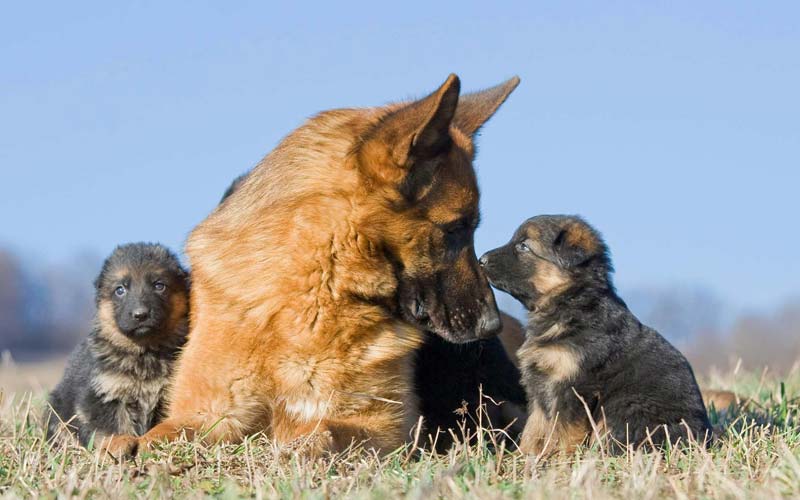
In most cases, maternal aggression or rejection stems from natural instincts, health issues, or environmental stress. By recognizing the causes and knowing the warning signs, you can create a supportive environment and intervene if necessary. This article will guide you through the reasons a mother dog might harm her puppies, the signs to look for, and steps you can take to prevent or address this behavior.
1. Understanding Canine Maternal Behavior
A mother dog’s natural instincts play a vital role in the care and development of her puppies. From the moment they are born, most mother dogs display nurturing behaviors essential to their puppies’ survival and growth. These maternal instincts are largely driven by hormones and are designed to protect and nourish the litter. However, just like with humans, not every mother dog behaves in the same way, and understanding these variations can help you support the bonding process.
Normal Maternal Instincts
Typically, a mother dog’s first priority is her puppies’ care and protection. She will lick her newborns to clean them, stimulate breathing, and encourage them to nurse. This licking is also a way for the mother to form a bond with her pups and recognize their scent. Nursing is another key behavior, with the mother ensuring her puppies feed frequently to get the nutrients they need for growth. You may also notice protective behaviors, such as a mother keeping her puppies close, defending them from perceived threats, or being wary of human interference.
These nurturing actions form the foundation of a healthy bond between mother and puppies, establishing a safe and caring environment for the litter to thrive.
Hormonal Influence on Maternal Instincts
Hormones, especially oxytocin, play a central role in triggering and sustaining maternal behavior in dogs. Oxytocin, often called the “love hormone,” is released during labor and nursing, enhancing the mother’s bonding instincts. It encourages protective and nurturing behavior, helping the mother dog focus on the needs of her puppies. Additionally, prolactin, another hormone linked to milk production, supports the mother’s drive to care for her litter.
These hormonal changes create a deep connection between the mother and her puppies, ensuring their early survival. However, if hormonal imbalances occur, a mother dog may not display typical nurturing behaviors, which can lead to neglect or aggression toward the puppies.
Behavioral Variations Among Mother Dogs
Not all mother dogs behave in the same way. First-time mothers, for instance, may be unsure or hesitant when caring for their puppies, sometimes leading to unintentional roughness or neglect. Inexperienced dogs might not immediately bond with their litter, requiring more time or intervention to form a proper connection. Conversely, experienced mothers tend to have stronger maternal instincts, managing their puppies with confidence and care.
Environmental factors and the individual temperament of the mother dog also play a role. A stressed or anxious dog may display different behavior compared to a calm and well-supported one. It’s important to recognize these variations and provide a stable, low-stress environment that promotes healthy bonding.
By understanding the range of normal maternal behavior and the hormonal influences at play, dog owners can better support mother dogs during this critical time, ensuring the puppies receive the care they need for a strong start in life.
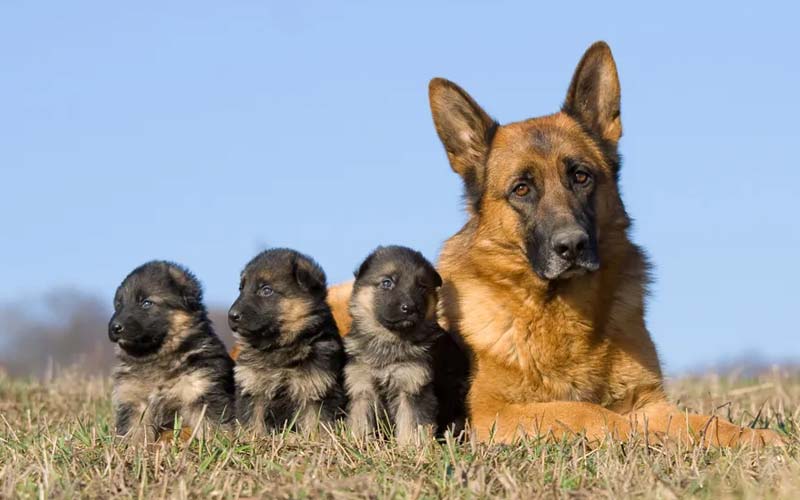
2. Reasons a Mother Dog Might Hurt Her Puppies
While most mother dogs are nurturing, there are situations where a mother may harm her puppies, whether intentionally or unintentionally. Several factors can contribute to this behavior, including stress, health issues, and hormonal changes. Understanding the root causes helps dog owners identify potential problems early and take the necessary steps to protect the puppies.
1. Stress and Anxiety
A chaotic or high-stress environment is one of the leading causes of aggression in mother dogs. Too much noise, excessive human interference, or the presence of other animals can overwhelm a mother dog. When she feels anxious or threatened, her protective instincts may turn into aggression. In some cases, this heightened stress can cause her to lash out at her own puppies, mistaking them for part of the threat.
To prevent this, it’s crucial to provide a calm, quiet environment for the mother and her puppies, especially in the first few weeks. Limiting external stimuli and giving her space can reduce anxiety and help maintain a healthy bond with her litter.
2. Rejection of Sick or Weak Puppies
Mother dogs have a natural instinct to focus their energy on the healthiest puppies. If one or more puppies are sick, weak, or not thriving, the mother may instinctively reject them. In extreme cases, she might even harm or kill them. This behavior is rooted in survival, as the mother prioritizes the care of stronger puppies that have a better chance of survival.
While this behavior is natural, it can be distressing for owners to witness. In such cases, it’s important to intervene by removing the weak puppy and providing necessary care, whether through hand-raising or veterinary assistance.
3. Lack of Maternal Instinct
Not all mother dogs are instinctively nurturing, especially first-time mothers. Inexperienced dogs may not know how to properly care for their puppies, leading to accidental harm. They may handle the puppies roughly or fail to nurse and clean them adequately. This lack of maternal instinct can result in neglect, and in some cases, the mother might become frustrated and aggressive toward her litter.
For first-time mothers or those displaying confusion, closely monitoring interactions and offering gentle guidance can help. If the mother is consistently unable to care for her puppies, human intervention may be necessary.
4. Postpartum Complications
Physical discomfort or medical conditions after giving birth can also lead to aggressive behavior. Conditions like mastitis, which causes painful inflammation of the mammary glands, or other postpartum infections can make the mother irritable. In these cases, the pain may cause her to lash out at her puppies if they attempt to nurse.
If a mother dog shows signs of physical discomfort, such as lethargy, swelling, or visible pain when nursing, it’s important to consult a veterinarian. Addressing postpartum complications early can prevent further issues and ensure the mother is able to care for her puppies without distress.
5. Hormonal Imbalances
Hormonal fluctuations after birth can significantly impact a mother dog’s behavior. While hormones like oxytocin typically promote bonding and nurturing, imbalances can lead to mood swings, irritability, or even aggressive tendencies. This can result in the mother rejecting or harming her puppies.
In cases of severe hormonal imbalance, where aggression or neglect becomes a persistent problem, professional guidance from a veterinarian is crucial. Hormone therapy or behavioral interventions may be recommended to help restore balance and protect the puppies.
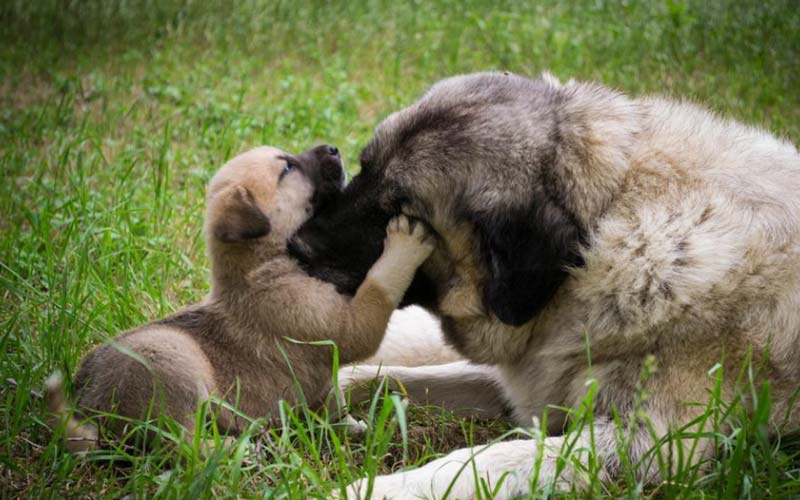
3. Warning Signs to Watch For
Recognizing early warning signs that a mother dog may harm her puppies is essential for ensuring their safety. While some behaviors may appear minor at first, they can escalate if not addressed promptly. Being aware of these signs allows you to intervene before the situation worsens.
Aggressive Growling or Snapping
One of the clearest warning signs of potential harm is aggression from the mother dog, such as growling or snapping at her puppies. While some level of discipline from the mother is normal, persistent growling or outright aggression indicates a problem. If the mother repeatedly avoids her puppies or acts defensively when they approach, she may be experiencing stress, pain, or discomfort, which can lead to more serious behavior.
When these signs of aggression appear, it’s important to monitor interactions closely. Removing the puppies temporarily or consulting a veterinarian may be necessary to prevent injury.
Neglecting to Feed or Care for Puppies
Maternal neglect can also be a sign that something is wrong. If a mother dog is not feeding her puppies regularly, refusing to nurse them, or failing to clean and interact with them, it could indicate stress, illness, or a lack of maternal instinct. Newborn puppies need constant care, and neglect can quickly lead to malnutrition, dehydration, and other health issues.
If you notice a mother dog avoiding her puppies or not tending to their basic needs, intervening early—such as supplementing feeding or creating a more stress-free environment—is critical to their survival.
Excessive Roughness
While mother dogs often handle their puppies to groom or move them, handling can sometimes become too rough, especially if the mother is inexperienced or stressed. Excessive roughness, such as dragging, biting, or overly aggressive handling, puts the puppies at risk of injury. First-time mothers may not fully understand how delicate their puppies are, which can lead to unintentional harm.
If the mother’s handling appears too rough, or if puppies seem distressed or injured during these interactions, consider stepping in to separate them and offer the mother guidance or seek veterinary help.
Physical Harm
The most concerning warning sign is visible physical harm to the puppies. This can include bite marks, scratches, or other injuries caused by the mother. Any sign of physical damage to the puppies, no matter how small, should be addressed immediately. Physical harm might stem from aggression, frustration, or rough handling, and if not managed early, it can result in serious injury or even death.
If you observe physical harm, separating the puppies from the mother temporarily and contacting a veterinarian is crucial to protect their well-being.

4. Steps to Prevent Harmful Behavior
Taking proactive steps to prevent harmful behavior in mother dogs is essential for ensuring the safety and well-being of both the mother and her puppies. By creating a supportive environment and monitoring interactions closely, dog owners can help foster a healthy maternal bond and minimize the risk of aggression or neglect.
1. Create a Calm Environment
Establishing a quiet, stress-free space is crucial for a mother dog and her puppies, especially in the first few weeks after birth. Choose a secluded area away from loud noises, high foot traffic, and other distractions. This serene environment allows the mother to focus on her puppies without the stress of external stimuli. Consider using soft bedding and comfortable materials to create a cozy den-like space that feels safe and secure for the mother and her litter.
2. Minimize Human Interference
While it’s natural to want to interact with the puppies, minimizing human interference is vital during the early bonding period. Allow the mother dog the space she needs to adjust to her new role without overwhelming her. Limit handling of the puppies to essential checks for health and safety, and avoid introducing too many people into her space at once. This will help the mother feel more secure and less anxious, encouraging her to focus on nurturing her puppies.
3. Monitor Interactions Closely
Regular but discreet monitoring of the mother and her puppies is essential. Observe their interactions from a distance to ensure the mother is caring for her litter without exhibiting signs of aggression or neglect. Look for normal behaviors like nursing, grooming, and protective actions. If you notice any warning signs of aggression or rough handling, be prepared to step in and intervene. This careful observation allows you to catch potential issues early before they escalate.
4. Provide Proper Nutrition and Care
A well-fed and hydrated mother dog is less likely to exhibit stress or aggression. Ensure she has access to high-quality food and fresh water, particularly during lactation. Proper nutrition supports her health and milk production, which is crucial for the puppies’ development. If the mother dog seems to be struggling with her appetite or hydration, consult a veterinarian for advice on dietary adjustments or supplements. A healthy mother will be better equipped to care for her puppies and exhibit calm, nurturing behavior.
5. Consult a Veterinarian Early
If you observe any signs of distress, aggression, or rejection of her puppies, it’s important to consult a veterinarian as soon as possible. A vet can assess the mother’s physical and mental health, checking for underlying medical conditions that may be affecting her behavior. Early intervention can address issues like hormonal imbalances, postpartum complications, or other health concerns that could compromise her ability to care for her litter.
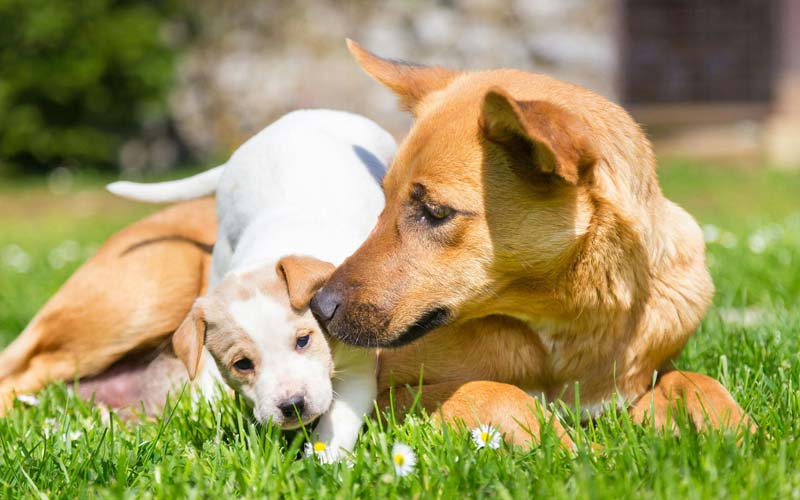
5. What To Do If a Mother Dog Hurts Her Puppies
If a mother dog exhibits aggressive behavior towards her puppies, it is crucial to take immediate and appropriate action to ensure their safety and well-being. Understanding the steps to intervene, along with alternative care options, can help safeguard the puppies and promote a healthier environment.
Immediate Intervention
When a mother dog becomes aggressive, the first step is to ensure the safety of the puppies. If they are in immediate danger, separate them from the mother dog. This can be done by gently removing the puppies and placing them in a secure area away from the mother, where they can be monitored closely. Be cautious during this process, as the mother may become defensive if she perceives her puppies are being taken from her.
Once the puppies are safe, assess the situation to determine if the mother is experiencing distress, pain, or other underlying issues that may have triggered her aggression. Observe her behavior from a distance, noting any signs of stress or discomfort.
Hand-Raising Puppies
If the mother dog is unwilling or unable to care for her puppies, hand-raising them may be necessary. This process involves feeding, cleaning, and providing care for the puppies until they are old enough to eat solid food and live independently. Here are some essential steps for hand-raising puppies:
- Feeding: Use a high-quality puppy milk replacer, following the recommended feeding guidelines based on the puppies’ age and weight. Bottle-feeding is the most common method; ensure the nipple is the appropriate size to prevent choking.
- Cleaning: Puppies cannot urinate or defecate on their own in the early weeks. Gently stimulate their genital areas with a warm, damp cloth after each feeding to encourage elimination.
- Temperature Regulation: Puppies are unable to regulate their body temperature effectively, so keep them warm using heating pads or blankets. Ensure there are no drafts in their environment.
- Socialization: Once the puppies are stable and healthy, begin introducing them to gentle human interaction to aid in their social development.
- Veterinary Care: Schedule a veterinary check-up to monitor their health, receive vaccinations, and ensure proper growth.
Behavioral Adjustment
If the mother dog shows signs of aggression but you believe there’s a chance for her to bond with her puppies, behavioral adjustment techniques can be beneficial. Start by providing a calm, low-stress environment for the mother. Gradually reintroduce her to the puppies, monitoring her behavior closely. Use positive reinforcement, such as treats or praise, when she displays calm and nurturing behavior.
Creating a positive association with her puppies can help encourage her maternal instincts. However, be prepared to intervene if any signs of aggression reappear.
When to Consult a Professional
In cases of severe aggression or neglect, consulting a professional is essential. A veterinarian can assess the mother for any underlying health issues that may be affecting her behavior, such as hormonal imbalances or postpartum complications. If medical issues are ruled out, a canine behaviorist can help develop a tailored training program to address aggression and promote bonding.
Seeking professional guidance ensures that both the mother and her puppies receive the best possible care and support, improving the chances of a positive outcome for everyone involved.
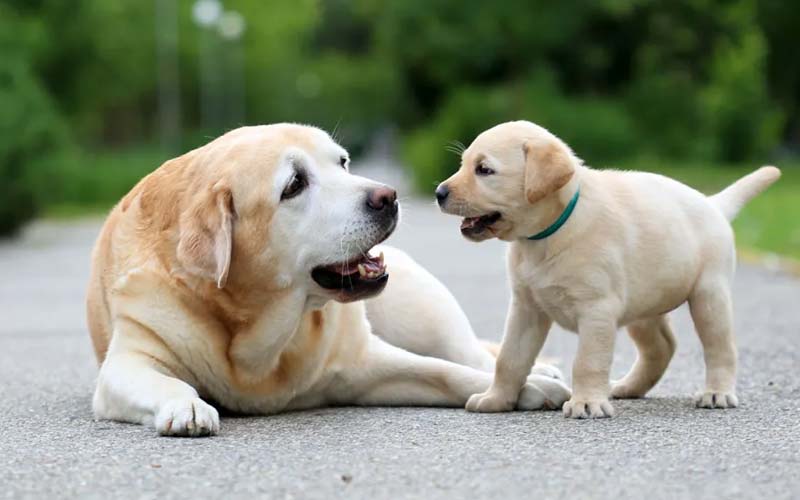
Conclusion: Will a mother dog hurt her puppies
Understanding the dynamics of a mother dog’s behavior is crucial for ensuring the safety and well-being of her puppies. While most mother dogs are nurturing and protective, there are circumstances where aggression or neglect may occur. By recognizing the potential reasons for harmful behavior, such as stress, lack of maternal instinct, or health complications, dog owners can take proactive steps to create a supportive environment.
It’s essential to watch for warning signs, including aggressive growling, neglect of care, excessive roughness, and physical harm to the puppies. By creating a calm space, minimizing human interference, monitoring interactions, and providing proper nutrition, owners can significantly reduce the likelihood of aggression.
In cases where a mother dog does exhibit harmful behavior, immediate intervention is critical. This includes separating the puppies for their safety, considering hand-raising if necessary, and exploring behavioral adjustment techniques. When in doubt, don’t hesitate to consult a veterinarian or a canine behaviorist for professional guidance.
Your role as a dog owner is vital in fostering a nurturing environment for both the mother and her puppies. Stay vigilant and take action at the first sign of trouble. By doing so, you can ensure a safe and loving atmosphere that allows both the mother and her puppies to thrive together.